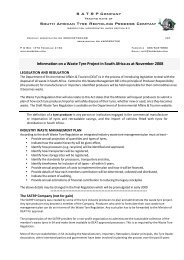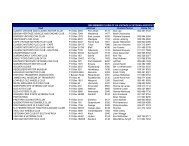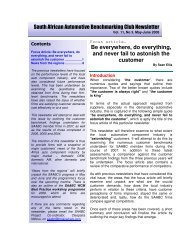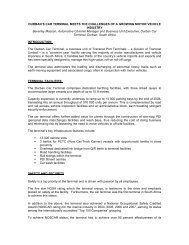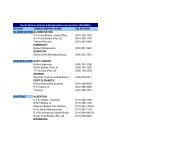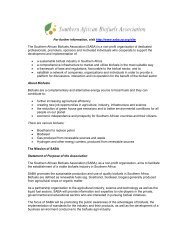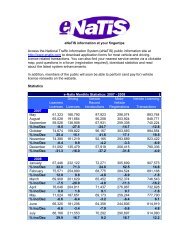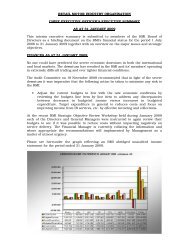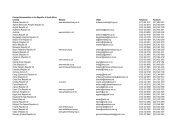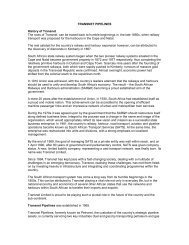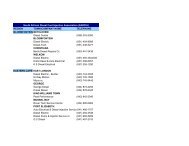Toyota South Africa Sustainability Report 2008 - Automotiveonline ...
Toyota South Africa Sustainability Report 2008 - Automotiveonline ...
Toyota South Africa Sustainability Report 2008 - Automotiveonline ...
You also want an ePaper? Increase the reach of your titles
YUMPU automatically turns print PDFs into web optimized ePapers that Google loves.
<strong>Sustainability</strong> <strong>Report</strong>_14-10-<strong>2008</strong>:Layout 1 10/14/08 2:44 PM Page 11<br />
Environmental Aspects<br />
TOYOTA EARTH CHARTER<br />
I. BASIC POLICY II. ACTION GUIDELINES<br />
1. Contribution toward a prosperous 21 st century society 1. Always be concerned about the environment<br />
Contribute toward a prosperous 21 st century society. Aim for growth that is in<br />
Take on the challenge of achieving zero emissions at all stages, i.e., production,<br />
harmony with the environment, and set as a challenge the achievement of zero<br />
utilisation and disposal<br />
emissions throughout all areas of business activities.<br />
(1) Develop and provide products with top-level environmental performance<br />
2. Pursuit of environmental technologies (2) Pursue production activities that do not generate waste<br />
Pursue all possible environmental technologies, developing and establishing new<br />
(3) Implement thorough preventive measures<br />
technologies to enable the environment and economy to coexist harmoniously.<br />
(4) Promote businesses that contribute toward environmental improvement<br />
3. Voluntary actions 2. Business partners are partners in creating a better environment<br />
Develop a voluntary improvement plan, based on thorough preventive measures<br />
Cooperate with associated companies<br />
and compliance with laws, that addresses environmental issues on the global, 3. As a member of society<br />
national, and regional scales, and promotes continuous implementation.<br />
Actively participate in social actions<br />
4.Working in cooperation with society<br />
(1) Participate in the creation of a recycling-based society<br />
Build close and cooperative relationships with a wide spectrum of individuals<br />
(2) Support government environmental policies<br />
and organisations involved in environmental preservation including governments,<br />
(3) Contribute also to non-profit activities<br />
local municipalities, related companies and industries.<br />
4. Toward better understanding<br />
Actively disclose information and promote environmental awareness<br />
III. ORGANISATION IN CHARGE <strong>Toyota</strong> <strong>South</strong> <strong>Africa</strong> Environmental Commitee (see page 9)<br />
Key Risks<br />
Four key areas of performance guide <strong>Toyota</strong> <strong>South</strong> <strong>Africa</strong>’s environmental efforts, based<br />
on the associated risks and opportunities. These are energy use and global warming,<br />
resource efficiency, use of substances of concern (SoC) and atmospheric quality.<br />
Within these four themes, the environmental issues that are key to <strong>Toyota</strong>’s success are<br />
water, waste and energy management, including carbon emissions, and volatile organic<br />
compound (VOC) management.<br />
Precautionary Principle<br />
The environmental framework established by <strong>Toyota</strong> Motor Corporation, and carried<br />
through to operations at <strong>Toyota</strong> <strong>South</strong> <strong>Africa</strong> translates the precautionary principle into<br />
practical measures. Agenda 21 states that where there are threats of serious or<br />
irreversible damage, lack of full scientific certainty shall not be used as a reason for<br />
postponing cost-effective measures to prevent environmental degradation. We have<br />
embedded this principle throughout the lifecycle of our vehicles.<br />
<strong>Toyota</strong> has a unique culture that places emphasis on preventative measures, Kaizen<br />
(continuous improvement) and problem solving. Our focus is on minimising risks across<br />
the full scope of strategy, technology, manufacturing, research and development,<br />
environment and social risks. For example, the Dealer Environmental Risk Audit<br />
Programme (DERAP) established five fundamental requirements for dealers, who are then<br />
audited against these.<br />
The precautionary approach is also emphasised through risk abatement; minimising<br />
environmental risks is one of the action items in the 4 th <strong>Toyota</strong> Environmental Action<br />
Plan, including the Eco-Factory programme.<br />
The precautionary approach is evident in our manufacturing drive. Plants are being<br />
designed and built to be sustainable, through employing natural energy sources such as<br />
solar power, and through environmental preservation by planting greenery around<br />
production sites. Energy conservation and resource saving activities are also being<br />
implemented, so that production plants can continue sustainable operations for at least<br />
<strong>Sustainability</strong> <strong>Report</strong> <strong>2008</strong> 11



